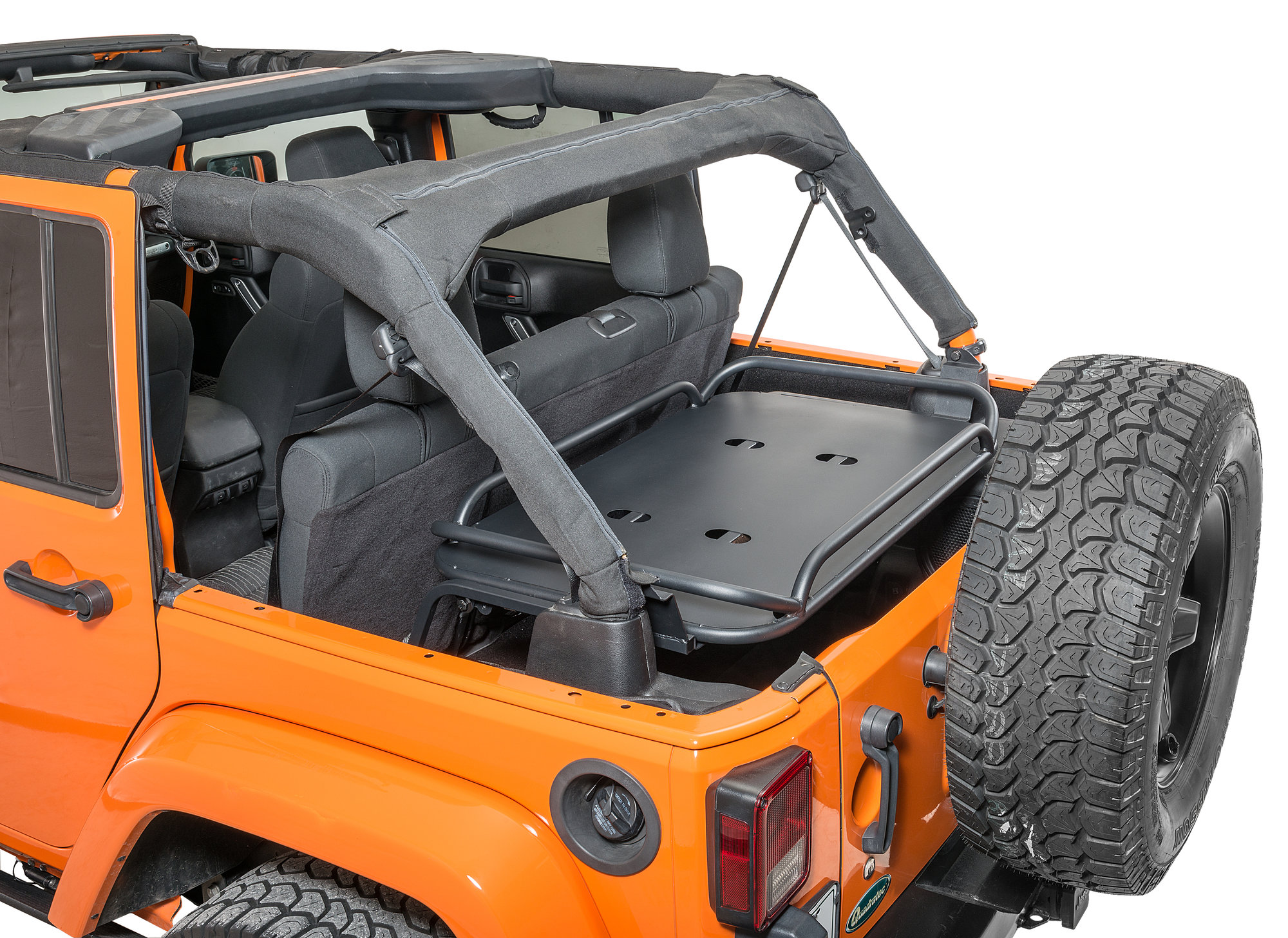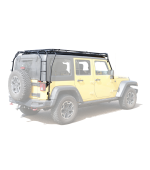You are using an out of date browser. It may not display this or other websites correctly.
You should upgrade or use an alternative browser.
You should upgrade or use an alternative browser.
Roof rack
- Thread starter NCAJeep
- Start date
DirtHeadDavis
Hooked
NCAJeep
Caught the Bug
Yaaa I really don’t like the looks of the exoskeleton deal. What’s the conventional wisdom for a 3-4 day rubicon run with a wife and two kids. I’ve got an American adventure lab cargo tray on order just looking at options if I need more space.I don't know anyone here that still runs a rack at all, but if you want one that is still in place topless or not I like the Gobi Stealth Rack.
View attachment 426679
OverlanderJK
Resident Smartass
Pack less stuff.Yaaa I really don’t like the looks of the exoskeleton deal. What’s the conventional wisdom for a 3-4 day rubicon run with a wife and two kids. I’ve got an American adventure lab cargo tray on order just looking at options if I need more space.
Ddays
Hooked
Throw one of these rear storage trays in
Other than that not much more you can do in a jeep

 www.quadratec.com
www.quadratec.com
Other than that not much more you can do in a jeep

Rampage Products 86623 Rear Interior Sport Rack for 07-18 Jeep Wrangler Unlimited JK 4 Door
Here's a new easy way to add extra storage to your 4 Door JK Wrangler! This clever storage rack features a sturdy powder coated steel tray which mounts easily in the rear cargo area with no drilling required.
WJCO
Meme King
NCAJeep
Caught the Bug
Go hiking.Pack less stuff.
NCAJeep
Caught the Bug
Right on. Wasn’t sure if there was a generally recommended solution but this makes sense.Throw one of these rear storage trays in
Other than that not much more you can do in a jeep

Rampage Products 86623 Rear Interior Sport Rack for 07-18 Jeep Wrangler Unlimited JK 4 Door
Here's a new easy way to add extra storage to your 4 Door JK Wrangler! This clever storage rack features a sturdy powder coated steel tray which mounts easily in the rear cargo area with no drilling required.www.quadratec.com
OverlanderJK
Resident Smartass
Are you telling me to? Or suggesting you should? I used to pack a lot of shit in a two door for multi day trips for my wife and I including a fridge. Pack and organize better and it'll fit.Go hiking.
benatc1
Hooked
I run a rhino rack platform with the Maximus-3 roll bar mounting system, have to drill through top but you can technically run it with or without the hard top. Has high load rating as well as it mounts to the roll bar. Maybe you can just get the Maximus mounts being you already have the platform
OverlanderJK
Resident Smartass
A bronco might be a better option for you.I get what you’re saying but I didn’t ask how much to pack.
I’m hoping to not need a roof rack but I also like to plan ahead and explore options. Thanks for your insight though!
bobfriesenhahn
Hooked
Leave the kids behind, remove the rear seats, and install a full Goose Gear setup with slide out drawers, a fridge, and a folding table on the tailgate.Yaaa I really don’t like the looks of the exoskeleton deal. What’s the conventional wisdom for a 3-4 day rubicon run with a wife and two kids. I’ve got an American adventure lab cargo tray on order just looking at options if I need more space.
NCAJeep
Caught the Bug
Why’s that?A bronco might be a better option for you.
NCAJeep
Caught the Bug
Maybe
Maybe if I make it to retirement age but that’s not gonna happen now. If I’m understanding correctly I shouldn’t need to carry so much spare parts and/or gear that I’d need a rack.Leave the kids behind, remove the rear seats, and install a full Goose Gear setup with slide out drawers, a fridge, and a folding table on the tailgate.
jeeeep
Hooked
how many spare parts/type are you taking? are you going with a group?Maybe
Maybe if I make it to retirement age but that’s not gonna happen now. If I’m understanding correctly I shouldn’t need to carry so much spare parts and/or gear that I’d need a rack.
easy pedal work and picking good lines should keep you from breaking things, of course anything is possible but a precheck on the most likely to fail components would be what I would do if I didn't know what's been done to the Jeep.
Fluid changes (diffs, transfer case etc...), check hubs and u-joints, aftermarket drives shafts or stock?
bobfriesenhahn
Hooked
It is a sort of Catch-22 situation that the heavier you make you Jeep, the more likely it is to have mechanical failure, or get stuck. Modern jeeps are so complex that many failures are not fixable outside of a dealership (or similar). There is an argument for bringing spares for mechanical or electrical parts which are most likely to fail on the trail, and spare fluids. But there is only so much you can do, and Jeeps are not good at carrying a lot of weight or "stuff" in general.Maybe
Maybe if I make it to retirement age but that’s not gonna happen now. If I’m understanding correctly I shouldn’t need to carry so much spare parts and/or gear that I’d need a rack.
If you are traveling with others, it may be that there is a skilled mechanic among them, but if there is not, then burdening the Jeep with many spare parts (many of which may be expensive or difficult to buy or replace under normal conditions) just in case they may fail does not make sense.
It is important to pack tow straps, jacks, battery jump pack, and whatever else is needed to get your Jeep to where a tow truck is willing to pick it up if possible. Normal towing like AAA is only willing to show up on normal roads, and off-road recovery can be very expensive.
Make sure that you have a means to call for help when there is no cell signal. Something like Garmin InReach is a good idea. If there is risk, then find someone else with a different vehicle to travel with you.
Backpackers are able to live for a week using what they are able to carry on their back. Dialing back on how you camp, and avoiding the modern overloaded "overland" approach, should allow a family of four to live out of a Jeep for st least as long as backpackers do. Use a ground tent, sleeping bags, camp stove, freeze-dried camp meals etc. Carry a lot of water, and in multiple containers. Water may be the most important thing that you carry.
TrailHunter
Hooked
This actually is the answer.. Pack your Jeep like a hiker packs a backpack.Go hiking.
Ddays
Hooked
What Jeeep said above...
Look, It's really easy to talk yourself into needing way more shit than you actually do. Unless you're going way into the back country or some serious rock crawling to get there, standard safety gear is gonna be enough. Unless you drive like a maniac, your Jeep isn't going to start shedding and breaking parts once you get on the trail. Pack fluids, u-joints, tire patch kit, good tool kit, compressor & you should be good. Unless you drag a trailer around
Look, It's really easy to talk yourself into needing way more shit than you actually do. Unless you're going way into the back country or some serious rock crawling to get there, standard safety gear is gonna be enough. Unless you drive like a maniac, your Jeep isn't going to start shedding and breaking parts once you get on the trail. Pack fluids, u-joints, tire patch kit, good tool kit, compressor & you should be good. Unless you drag a trailer around
sm31
Active Member
Not a direct response to the use case but for everyone who is too snooty to slap a rack on their jeep, kindly piss off. Lol...
I have a cheap, rain gutter mounted rack. I use it to transport two 5+ ft diameter dip nets with 30 ft (break down to 10 ft lengths) poles to my preferred dipnet location, which involves a 2 hour drive followed by 3 miles down a deep, sandy beach that requires I air down to not get stuck.
For my needs, a cheap roof rack is ideal. I just make sure to remove it as soon as I get home so hopefully nobody sees it on my jeep.
I have a cheap, rain gutter mounted rack. I use it to transport two 5+ ft diameter dip nets with 30 ft (break down to 10 ft lengths) poles to my preferred dipnet location, which involves a 2 hour drive followed by 3 miles down a deep, sandy beach that requires I air down to not get stuck.
For my needs, a cheap roof rack is ideal. I just make sure to remove it as soon as I get home so hopefully nobody sees it on my jeep.


